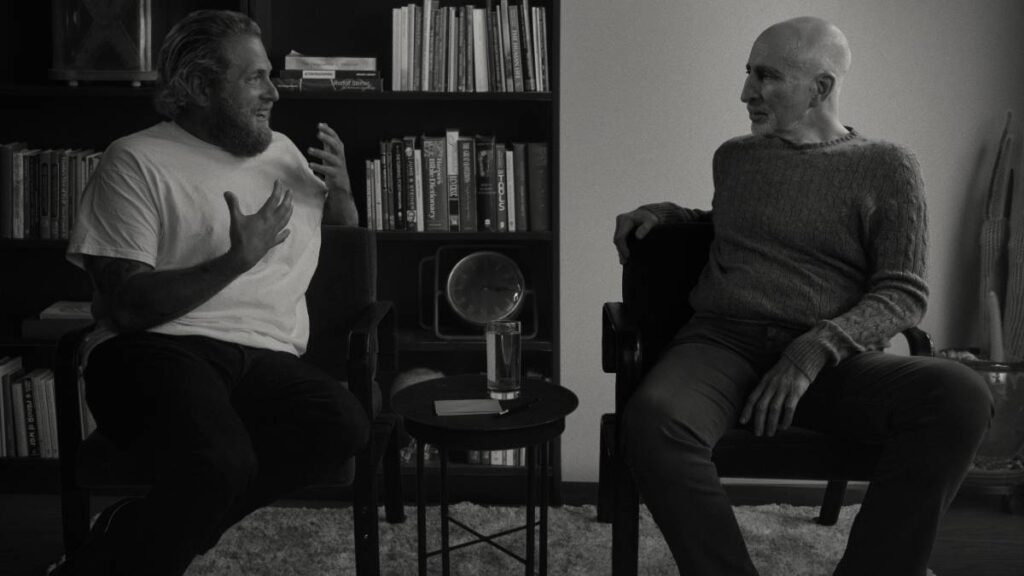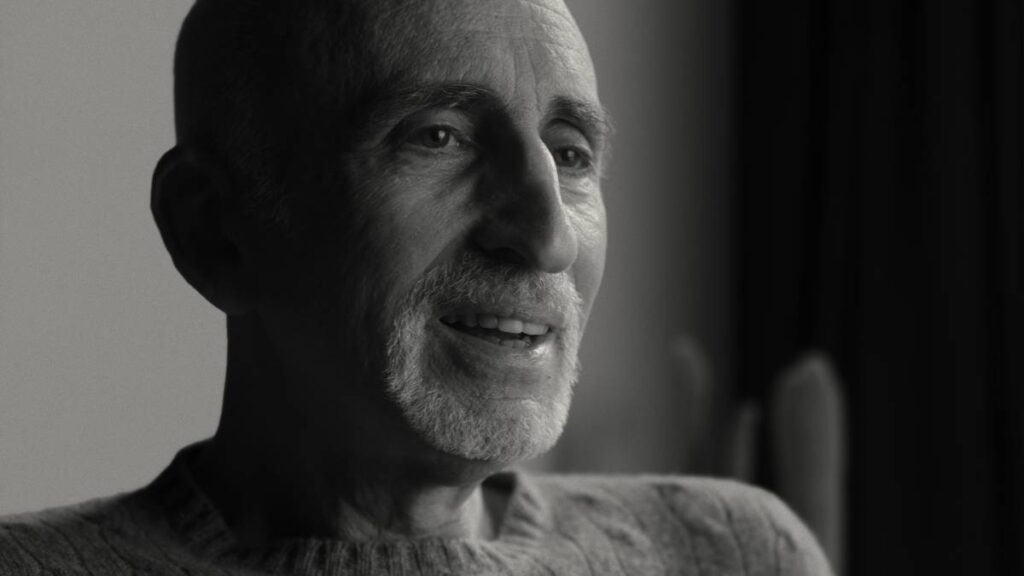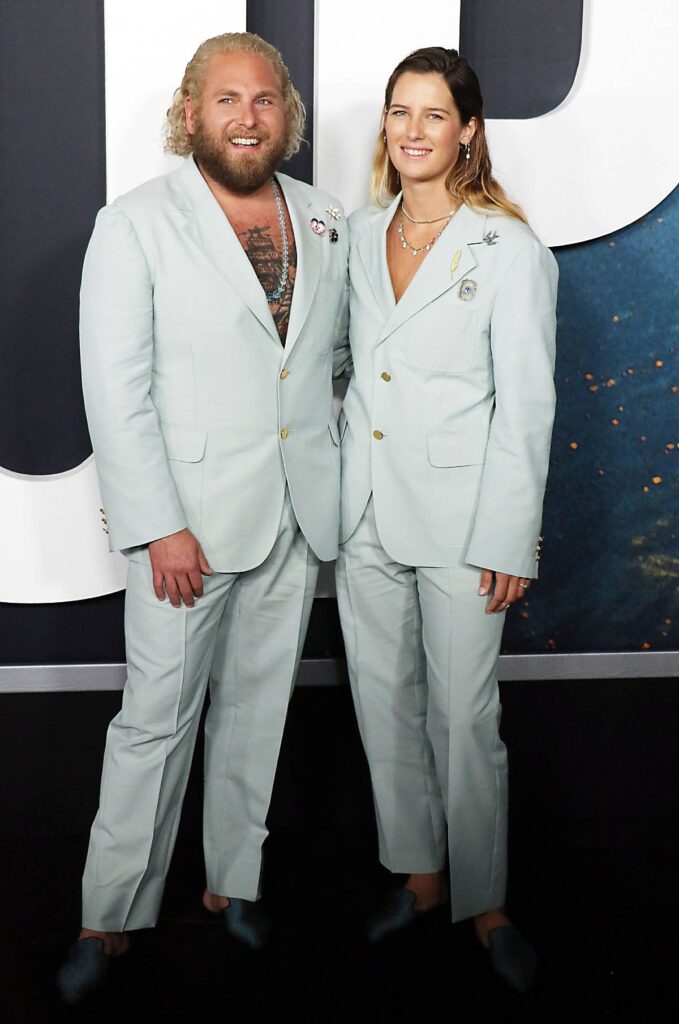Jonah Hill’s documentary, Stutz, just released its trailer. Stutz is the name of Jonah’s therapist, Phil Stutz, who is apparently both his therapist and longtime friend. The first thing Jonah says in the trailer is that he gets how unusual it is to film his own therapy and therapist. And I the brief bit we get to know Stutz in the trailer, he also seems unsure about it. But he also acknowledges that this is Jonah’s journey and if this is what Jonah feels he needs to do, then Stutz backs him on it. Jonah said the reason he was moved to make this documentary is because his life got “immeasurably better” working with Stutz. He’s hoping that maybe if people see how it helped him, they can see how it may help them.
Jonah Hill is facing his mental health struggles head-on in his upcoming documentary, Stutz.
The trailer for the film, which was directed by Hill, was released Monday and gives an inside look at the 38-year-old actor’s unorthodox therapy session with his longtime friend and therapist Phil Stutz in an effort to shed light on the tools that can help those struggling with mental health.
“I’m just gonna acknowledge how odd this endeavor is — a patient making a movie about his therapist,” Hill says. “But my life has gotten immeasurably better as a result of working with you. If it worked for me, maybe it will work for other people.”
The Wolf of Wall Street star, who has been open about his recent struggles with anxiety, explains that he’s allowing himself to be vulnerable in hopes of getting others to do the same and work on their own problems.
“You can’t move forward without being vulnerable,” Stutz tells Hill in the trailer. “Vulnerability, connection to the rest of the world. You’re giving out the signal to the world, ‘I need you because I can’t do this by myself.’ “
I posted the trailer below. I was intrigued by this project when I first read about it. Watching the trailer, I’m on the fence. Stutz looks like quite the character and that may be enough for me to watch. It’s brave for Jonah to do this. I can’t think of many people who would be comfortable showing their most vulnerable side on camera, even if they had editing rights. And I do think showing people how approachable therapy can be and the effect it can have might encourage some to finally try it. But I hope the film emphasizes that individual therapy is personalized, and advice given on screen to a patient is not universally applicable. Conversely, not all therapists are a fit for every patient.
However, the point remains that Jonah’s overall health has improved so much he felt he needed to share how with the world. That’s a pretty powerful message and I do hope people are listening. And Stutz can’t really receive a nicer compliment than “you are so good at what you do that I want to make a documentary about it.”
Stutz comes out November 14. Remember that Jonah is not promoting his films and has taken down his social media so the photos here will start to look familiar. Here’s the trailer:
Photo credit: Netflix and Cover Images














Good for him if it helps mentally. The last few years have been really hard on many of us.
Therapy has quite literally saved my life. An anti-depressant and, when it was needed, an anti-anxiety medication helped immensely but without therapy along with it, I probably would have committed suicide. I was raised in a blue collar, we don’t talk about emotions, old school family in Maine so therapy seemed like a massive indulgence when I started. It’s uncomfortable and sometimes feels ridiculous and I could not recommend it more!
This. Thank you for supporting therapy + medication as this is exactly how we educate our patients on the wrap around process for best patient outcomes. My greatest strength as a therapist is psychoeducation based. I find visualization to be one of the most impactful ways to teach. I draw circle with little dot in the middle representing the patient. Then around the outside I write all the potential support like primary care doc, psychiatrist (medication management), therapist (talk therapy), friends, family, colleagues (emotional support). They hold together like puzzle pieces supporting the patient on the treatment journey. This circle can be very fluid with unique support systems. Each treatment plan is tailored to the needs of the patient.
I’m definitely going to watch the docu.
Just remember – there are all types of levels of therapists out here. The difference between valuable therapy and throwing your money away is this: A good therapist identifies a goal or something specific the patient wants to work on. A therapist who talks the majority of the session or never identifies a goal is not being helpful. You want to be moving toward something during your sessions. You want to be practicing what you learn in your sessions. You want to report back any examples large or small how you used the skills you learned.
I’ve been on the fence about therapy for myself for some time so I’ll watch with interest. I really like Jonah’s work. Good for him for being so brave and putting this out there for us.
@Janey – I was just going to say this won’t be for everyone but it may help some people take the mystique out of the process. I hope it helps you. I’d echo what Kaiser says – the first one you try may not “fit “ but keep looking.
What a great message. I was raised in a family that didn’t talk about mental health either, in spite of the fact that we brew anxiety like a fine wine. I purposely talk about my success with anti-anxiety meds and therapy to get my family (all who also have anxiety imho though I am not a doctor) just to be able to even imagine the concept of therapy. I’m so glad he is helping to normalize mental health.
“Brew anxiety like fine wine” – bingo! Great phrase and kudos to you for your efforts
I’m a MH therapist. I love the de-stigmatized presentation of therapy here. The idea of showing a single session to help demystify and normalize therapy is great. But as a licensed therapist, there are ethical considerations regarding Stutz being Jonah’s “longtime friend and therapist.”
That kind of dual relationship can interfere with the therapeutic relationship. 99% of therapists and patients are not personal friends so I hope that it addressed. Most people want to be friends with their therapists but therapists realize this is not the point. Boundaries.
Yes to therapy and to ending the stigma attached to mental healthcare. I am glad Jonah is doing well, that’s wonderful news.
So glad for good news for him (for ANYBODY, frankly, these days).
I need so much therapy but it’s not easy for me to access, in particular because of my work schedule. It’s also not all that affordable even with insurance, here in the US anyway. It can be over $100 for a 1 hour session and a lot of insurances will cover a psychiatrist for medication monitoring but not any kind of psychologist or therapy services. There is a lot of passive support for psych services in this country that doesn’t amount to much because too many people simply cannot afford to deal with their mental health. Guess my point is I wholeheartedly agree with Jonas, I just wish what he is suggesting was more accessible to everyone everywhere.
Very apt about the passive support for mental health in the US.
Agree with Ann! Thanks for pointing this out. This is what annoys me with therapy is everyone likes to talk about how amazing it is and how it changed their life we all need to do it except it is often so hard for many people that need it the most to access it. Was talking to my friend the other day who is a stay at home mom to multiple kids and she knows she needs it so bad but literally has no one to watch her kids and no time. I live in a health desert area where we are so underserved and therapy waitlists are often a year or so long and even then you’re probably not actually gonna end up seeing anyone.
My take is that therapists are basically for higher income people that have the time and ability to afford it or good insurance that covers it. I think people without access often just have to take the medication and hope that helps them deal with whatever life circumstances they’re going through. Therapy is absolutely a luxury and I kind of roll my eyes at the “we need to normalize it” crowd. Ya but if it’s only Available to a small percentage of the population it’s kind of hard to normalize it on a large scale.
So I’m not surprised a wealthy, white dude from Hollywood with a flexible job is making this documentary but I hope it helps some people but I don’t think it’s going to change the landscape unless we figure out a way to get a lot more therapists to communities and people that need them who don’t have flexible jobs and/or good insurance and child care support.
Well, I *say* “normalize therapy,” but I am using a sort of shorthand or metonymy for “we should normalize/prioritize *mental and emotional health*.” I know that therapies are prohibitively expensive (I pay for one friend’s DBT and another’s Mindbloom). And, just as my therapists do, I believe DBT should be part of elementary-school curriculum, just like “bodily autonomy” or “teeth-brushing.” In my 30s I finally learned “emotional regulation” and “interpersonal effectiveness” for myself: things I should’ve learned in the course of being a kid (except that I never got to be a kid, except at school!). DBT would help ALL kids get socialized, but it would especially help kids with cptsd, with other types of neurodivergencies or executive dysfunction, and even kids who just don’t fit in (i.e. homeschoolers). It should be curriculum.
My EMDR is also expensive — although insurance would pay a portion, if I’d just turn in my invoices — and I had to be diagnosed with PTSD before I was “allowed” to have it. The same was true, at least for me in Florida, of psychedelic therapy… which, being as it is almost a “one and done,” would be more time- and cost-effective than CBT, DBT, or talk therapy. In any case, unrecognized physical and emotional trauma is the real “silent epidemic” right now, and it will continue to put an unbelievable strain on healthcare, and on capitalism itself, as people drop out of society disabled — since unrecognized trauma has deleterious, and all-encompassing, mental AND physical health consequences. Preventative healthcare is the key and, yes, this ought to include mental healthcare.
To conclude: When I say “normalize therapy!” I mean there needs to be a full systemic and structural change. I DON’T mean that people — often exhausted or debilitated people — should be putting themselves in therapy. (But… I do get what you’re saying. When I was financially poor, stuff like “eat organic!” was like “…how?” )
As a psychotherapist I am thrilled both that Jonah Hill has been helped so much by therapy and that he wants to bring more positive attention to it as a process. I want to bring therapy to as many people as. possible. I wish there was something that was possible to make it more affordable to clients.
As a psychotherapist I think you are uniquely able to provide care for those less able to pay by, perhaps, charging them less? Even lawyers do pro bono work.
Ah, a love letter! I am into it. I have said before that my two therapists are “my family I pay.” I would go to war for either of them. (“Saving my life” will probably be a long process I’ll be working on for the REST of my life, but yeah, they have prepared me for that journey.)
Jonah Hill has never been a public disaster like some of the people we discuss here, but I am pretty sure he has gone through some very monstrous stuff — a lot of it internalized. If this therapist is the person who helped JH change his worldview, free him from shame, and offer him a model of healthy masculinity?, that freaking rules, and I will watch it. The world needs more of this, tbqh. Let’s demystify and normalize therapy, make it accessible, and crush the patriarchy from the inside out by helping people recognize and heal from it.
P.S. Not that it matters one whit, but he also *looks* terrific. I’m sure a lot of us know what it feels like to be applauded for thinness when we’re actually very sick.